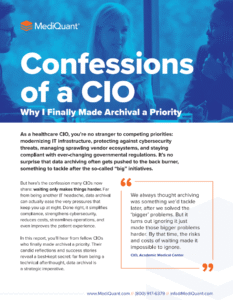The ROI of Legacy ERP Data Archiving
What is ERP data archiving?
ERP data archiving is the process of extracting, storing, and securing legacy enterprise resource planning (ERP) data after the system has been retired or replaced. Rather than migrate every data set into a new platform or leave outdated systems running indefinitely, archiving allows healthcare organizations to offload structured data into a centralized, compliant repository. This is a critical step in the ERP decommissioning process, ensuring that data remains protected even after the system is retired.
Purpose-built solutions like MediQuant’s DataArk data archiving solution allow organizations to archive financial, HR, payroll, and supply chain records while keeping them accessible for audits, reporting, or legal inquiries.
Why data archiving is essential in healthcare
Hospitals and health systems are required to preserve employee and payroll data for varying durations depending on state and federal regulation. Hospitals must retain payroll records for a minimum of three years according to the Fair Labor Standards Act (FLSA). However, records supporting wage calculations like timecards must be kept for at least two years, and federal tax records must be retained for at least four years after the taxes are paid or due. Many attorneys recommend a longer retention period, such as seven years, to cover all potential statutes of limitation, especially after an employee separation. A strategic ERP data archiving plan and data retention guidelines will account for these regulations to ensure you’re preserving the right data for at least the minimum required timeframe to avoid penalties for non-compliance.
Data retention and regulatory compliance aren’t the only considerations. When legacy systems linger past their prime, costs and risks compound quickly. Health systems continue paying annual licensing fees for software they no longer actively use. Infrastructure teams must maintain outdated environments that consume valuable server and storage resources. Unpatched or unsupported systems introduce security vulnerabilities, while IT staff lose valuable time maintaining, accessing, or reconciling historical data that could otherwise be housed securely in an archive.
Archiving legacy ERP data allows healthcare IT leaders to shift from reactive maintenance to proactive management and begin a structured ERP decommissioning process with less disruption and greater control. It reduces cost, risk, and complexity while meeting all compliance standards.
How ERP data archiving delivers ROI
The return on investment for archiving legacy ERP data can be measured in three major areas: financial, operational, and risk reduction.
Financial ROI: License and infrastructure savings
Archiving ERP data paves the way to full decommissioning. This means:
- Eliminating annual licensing costs worth millions
- Avoiding infrastructure upgrades just to support legacy apps
- Reducing cloud hosting or colocation costs
Most health systems are running multiple overlapping platforms, from HRIS to financial systems to supply chain management, that could be sunset if their data was archived properly.
Operational ROI: Time and resource efficiency
Without archiving, IT teams often resort to workarounds to access historical data, like isolated servers, aging interfaces, and one-off requests from finance or HR. ERP data archiving streamlines systems by providing:
- Secure, searchable access to legacy data
- Simplified reporting and audit response
- Less time spent by IT staff triaging requests
The time savings can be redirected to more strategic modernization initiatives, such as ERP optimization, cybersecurity, or application rationalization.
Risk ROI: Compliance and data protection
Storing legacy ERP data in systems not designed for long-term archival creates risk. From HIPAA to IRS retention rules, noncompliance can carry steep consequences.
Archiving legacy ERP data in an active archive reduces this risk with:
- Encryption, access controls, and HITRUST-certified hosting
- Retention rules that align with healthcare standards
- Chain-of-custody tracking for audits or legal defense
CIOs can assure legal and compliance teams that even after the legacy ERP is disposed of, their data remains intact, accessible, and defensible.
Together, these financial, operational, and risk reduction benefits form the foundation for the ROI of data archiving in healthcare ERP strategy.
How to plan for ERP decommissioning
Archiving alone doesn’t deliver ROI unless it leads to full ERP system retirement. But how do CIOs get from archived data to a truly decommissioned platform?
That’s where an ERP decommissioning strategy comes in. Leaders must work with vendors to:
- Define what data needs to be archived, migrated, or purged
- Validate that all required data is secure and accessible
- Ensure end-users can still perform reporting, audits, and retrieval
- Shut down the original ERP system once replacement access is verified
A successful ERP data migration plan should establish these goals upfront, so that archival becomes a step towards a modernized HIT environment. Migrating ERP data to a new system without doing this critical planning step first can lead to costly issues down the line.
Common ERP archiving pitfalls to avoid
Many organizations delay archiving until the very end of the ERP transition. But this often leads to rushed decisions, data mapping errors, or systems kept online longer than necessary.
Other common missteps include:
- Archiving too much data, increasing cost and complexity
- Migrating data that could have been safely archived during the ERP decommissioning process instead
- Overlooking the categories of data with different retention needs
To avoid these pitfalls, refer to The Categories of ERP Data and Their Migration Requirements, which breaks down what to migrate vs. archive based on system type, access needs, and retention timelines.
Demonstrating ROI and future-proofing to leadership
For the CIO advocating for ERP data archiving, it’s important to communicate to decision-makers both the immediate ROI and the long-term benefits to security and operational continuity.
By disposing of legacy ERP systems and migrating critical datasets to purpose-built platforms, organizations can eliminate unnecessary licensing costs worth millions, demonstrate compliance and risk reduction to legal teams, reduce infrastructure burden, and free up IT resources.
Beyond the immediate ROI, archived data continues to deliver value. Secure access to legacy ERP data supports ongoing reporting, payroll audits, and regulatory reviews. Purpose-built solutions for ERP data archiving ensure data remains searchable and compliant long after the system is retired, minimizing risk while maximizing usability.
This is where the strategic case for data archiving becomes strongest. Archiving complements a robust ERP decommissioning process and can be paired with ERP Data Conversion Best Practices in Healthcare to future-proof operations. The result is a data infrastructure that’s leaner, more secure, and built for long-term sustainability.
Why vendor choice matters
For most healthcare organizations, ERP data archiving is not a DIY project, nor should corners be cut. A health system that wants to modernize its data systems and set itself up for regulatory and interoperability success should choose their ERP archiving partner carefully.
MediQuant’s DataArk is built specifically for this need. With HITRUST certification, decades of healthcare experience, and proven success decommissioning ERP systems, MediQuant helps health systems:
- Archive ERP data securely and compliantly
- Support audits, reports, and legal access needs
- Retire legacy ERP systems with full confidence in continuity
Unlike generic cloud storage or DIY exports, DataArk ensures archived data stays usable, reportable, and aligned to healthcare’s unique retention rules.
Ready to capture the ROI of ERP data archiving?
Get a demo with MediQuant about building a strategy that lets your organization archive legacy ERP data, retire old systems, and save millions, without compromising on access or compliance.

More Thought-Leadership
PDFs, Document Mapping & the Hidden Risks in EMR Data Conversion
Every EMR data conversion hits a moment where things get interesting. The most challenging moments usually involve a PDF. Or 6,000 of them: Scanned records. Faxed notes. Legacy imaging exports. At first glance, they seem manageable. That is, until they start breaking...
What to Validate Before you Hit ‘Go’ on Your EMR Conversion
An EMR conversion is more than a technical lift; it’s a clinical, operational, and financial risk if done wrong. By the time you reach this stage in your transition, you’ve already scoped, mapped, and test-loaded your data. The finish line is near. But it also happens...
EMR Data Conversion: A 5-Step Guide to Getting It Right
EMR data conversion is the process of securely transferring patient data from a legacy electronic medical record (EMR) system into a new one. It’s a foundational step for health systems navigating mergers, EHR upgrades, or the sunsetting of unsupported platforms. And...
Contact Us Today







